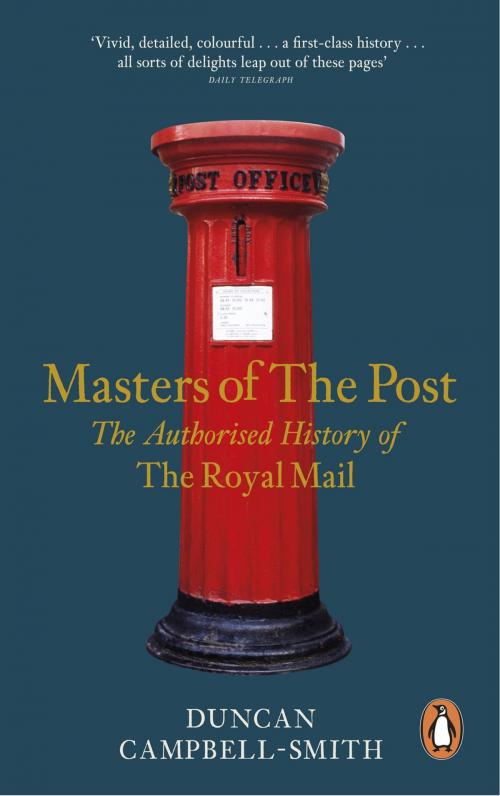Masters of the Post
The Authorized History of the Royal Mail
Business & Finance, Economics, Economic History, Nonfiction, History, British| Author: | Duncan Campbell-Smith | ISBN: | 9780141973227 |
| Publisher: | Penguin Books Ltd | Publication: | November 3, 2011 |
| Imprint: | Penguin | Language: | English |
| Author: | Duncan Campbell-Smith |
| ISBN: | 9780141973227 |
| Publisher: | Penguin Books Ltd |
| Publication: | November 3, 2011 |
| Imprint: | Penguin |
| Language: | English |
The origins of the Post Office go back to the early years of the Tudor monarchy: Brian Tuke, a former King's Bailiff in Sandwich, was acknowledged as the first 'Master of the Posts' by Cardinal Wolsey in 1512, and went on to build up a network of 'postmasters' across England for Henry VIII. Over the following five hundred years the Royal Mail expanded to an unimaginable degree to become the largest employer in the country, and the face of the British state for most people in their everyday lives. But it also faced the demands of an increasingly commercial marketplace. With the election of Margaret Thatcher in 1979, the possibility of privatising the Royal Mail has prompted passionate arguments - and has added immeasurably to the difficulties of running it.
In charting the whole of this extraordinary story, Duncan Campbell-Smith recounts a series of remarkable tales, including how postal engineers built the first programmable computer for the wartime code-breakers of Bletchley Park and how the Royal Mail managed to successfully continue delivering post to the front lines during two world wars, but also how they failed to avert the Great Train Robbery of 1963. He brings to life many of the dominant personalities in the Royal Mail's history - from Rowland Hill, who imposed a uniform penny post and set the great Victorian expansion on its way, to Tony Benn who championed the modernisation of the service in the 1960s and Tom Jackson who led the postal workers' biggest union through fifteen frequently stormy years up to 1982.
This is the first complete history of the Royal Mail up to the present day, based on its comprehensive archives, and including the first detailed account of the past half-century of Britain's postal history, made possible by privileged access to confidential records. Today's debate over the future of the Royal Mail is shown to be just the ;atest chapter in a centuries-old conflict between its roles raising revenue and serving the public. Will its employees remain, like Brian Tuke's postmasters, servants of the Crown? This book could hardly appear at a more timely moment.
The origins of the Post Office go back to the early years of the Tudor monarchy: Brian Tuke, a former King's Bailiff in Sandwich, was acknowledged as the first 'Master of the Posts' by Cardinal Wolsey in 1512, and went on to build up a network of 'postmasters' across England for Henry VIII. Over the following five hundred years the Royal Mail expanded to an unimaginable degree to become the largest employer in the country, and the face of the British state for most people in their everyday lives. But it also faced the demands of an increasingly commercial marketplace. With the election of Margaret Thatcher in 1979, the possibility of privatising the Royal Mail has prompted passionate arguments - and has added immeasurably to the difficulties of running it.
In charting the whole of this extraordinary story, Duncan Campbell-Smith recounts a series of remarkable tales, including how postal engineers built the first programmable computer for the wartime code-breakers of Bletchley Park and how the Royal Mail managed to successfully continue delivering post to the front lines during two world wars, but also how they failed to avert the Great Train Robbery of 1963. He brings to life many of the dominant personalities in the Royal Mail's history - from Rowland Hill, who imposed a uniform penny post and set the great Victorian expansion on its way, to Tony Benn who championed the modernisation of the service in the 1960s and Tom Jackson who led the postal workers' biggest union through fifteen frequently stormy years up to 1982.
This is the first complete history of the Royal Mail up to the present day, based on its comprehensive archives, and including the first detailed account of the past half-century of Britain's postal history, made possible by privileged access to confidential records. Today's debate over the future of the Royal Mail is shown to be just the ;atest chapter in a centuries-old conflict between its roles raising revenue and serving the public. Will its employees remain, like Brian Tuke's postmasters, servants of the Crown? This book could hardly appear at a more timely moment.















